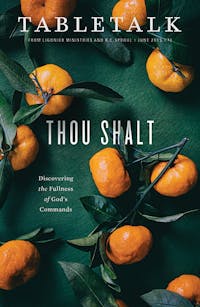
Request your free, three-month trial to Tabletalk magazine. You’ll receive the print issue monthly and gain immediate digital access to decades of archives. This trial is risk-free. No credit card required.
Try Tabletalk NowAlready receive Tabletalk magazine every month?
Verify your email address to gain unlimited access.
Have you ever slept for several hours, woke up, but remained unrefreshed? Perhaps you remember Washington Irving’s story “Rip Van Winkle.” Rip is a henpecked husband who wanders to the mountains to escape, meets a strange crew, falls asleep, and snoozes for twenty years. He wakes up to find the world completely changed, his wife dead, and his neighbors envious that he had outslept his nagging wife’s natural life.
What’s striking about Irving’s story is that Van Winkle’s sleep wasn’t restful. It was sleep without refreshment. This was a kind of resting that did no real good. And sometimes, we know what that’s like because our hearts and minds are too full and anxious to rest well. We sometimes wake up or come back from vacations unrefreshed despite having rested.
The grace of the fourth commandment is that God promises to give us real rest and real refreshment when we find our rest in Him. As we remember the Sabbath day, as we keep it holy to the Lord, we find that we begin to enter into the rest that God offers and gain a foretaste of the heavenly rest to come, the rest of the new heavens and new earth.
God’s Good Command
In Exodus 20:8–10, it is clear that God gives Sabbath rest as a command. However, we often miss that as we “remember the Sabbath day, to keep it holy,” God intends for us to use that day for Him: “The seventh day is a Sabbath to the LORD your God.” What does this mean? It means that one day in seven—not a day of our choosing, but a day of God’s own choosing and a day unlike other days—is to be set apart for the Lord’s service.
And this command is rooted in both creation and redemption. In Exodus 20, creation serves as the ground: “For in six days the Lord made heaven and earth … and rested on the seventh day” (v. 11). The creation week serves as a pattern for our creative weeks: just as God worked six and rested one, so should we.
But in Deuteronomy 5, this command finds its basis in redemption: “You shall remember that you were a slave in the land of Egypt, and the LORD your God brought you out from there with a mighty hand and an outstretched arm” (v. 15). Because God redeemed His people out of captivity with the blood of firstborn lambs, their lives and their time belonged to Him. He gave it back to them in redemption and required the Sabbath day as a witness, a “firstfruits” of the week, a testimony to His redemptive work.
Christ’s Gracious Gift
This Sabbath expectation and command find their fulfillment and continuing validity in Christ. That is because Jesus Himself pointed to the release that the day represented. Far from doing away with the Sabbath, Jesus filled it with meaning for His people.
In Luke 4:16–21, Jesus went to the synagogue on the Sabbath day “as was his custom.” He took the scroll and read from Isaiah 61, declaring, “Today, this Scripture has been fulfilled in your hearing.” The link between Sabbath and Messiah was plain: the promised Sabbath of rest and rejoicing, pictured in creation and redemption, has come in Jesus. He brings good news, the Lord’s favor, liberty, sight, and freedom.
Jesus loved to heal on the Sabbath. That seems clear in Luke 13:10–17. A woman bound by a “disabling spirit for eighteen years” is healed and she glorifies God. The Pharisees are furious with Jesus. His response: “Ought not this woman be loosed from this bond on the Sabbath day?” Isn’t it fitting and right? Creation and redemption come together on the Sabbath day to point to Christ’s gracious gift of real renewal, rest, and refreshment.
Jesus does these things because He is the Lord of the Sabbath (Mark 2:23–28). He is the giver of the Sabbath as the Creator. He is the One about whom the Sabbath testifies. And, as Redeemer, He has started time anew through the resurrection. Indeed, on the Sunday of His resurrection, time began again; the first day of the new creation started. The Sabbath rest secures its meaning on Resurrection Sunday, setting the day for Christian worship (1 Cor. 16:2; Rev. 1:10). We remember this day to the Lord’s service in worship and mercy, in response to God’s good command and Christ’s gracious gift.
We who trust in Jesus not only find rest for our souls Sunday by Sunday, but we also have the promise of entering into the final Sabbath rest (Heb. 4:9–10). We testify each week that we have rested from our works—from our attempts to placate God or earn His favor, even in how we “remember the Sabbath.” Instead, we “rest in and receive” Jesus. In Him, we find rest for our souls (Matt. 11:28–30).
That’s why the Sabbath day brings real rest and refreshment. We aren’t in a frenzy trying to earn God’s favor. Rather, the Lord of the Sabbath Himself has raised us and will raise us from the dead (Eph. 2:4–6).
